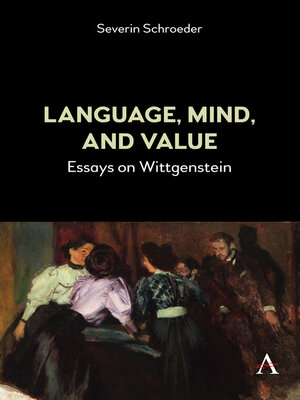Language, Mind, and Value
ebook ∣ Essays on Wittgenstein · Anthem Studies in Wittgenstein
By Severin Schroeder

Sign up to save your library
With an OverDrive account, you can save your favorite libraries for at-a-glance information about availability. Find out more about OverDrive accounts.
Find this title in Libby, the library reading app by OverDrive.



Search for a digital library with this title
Title found at these libraries:
| Library Name | Distance |
|---|---|
| Loading... |
This book is a collection of 15 essays on important themes in Wittgenstein's philosophy, divided into three sections. The first section is about philosophy of language, in particular Wittgenstein's key idea of linguistic normativity. The second section is mainly concerned with important Wittgensteinian contributions to the philosophy of mind and action: his analysis of sensation language, the concept of understanding, the explanation of human behaviour and the concept of knowledge. The final section focusses on questions of value, mainly in aesthetics, but also in ethics and religion.
|This book is a collection of 15 essays on important themes in Wittgenstein's philosophy, divided into three sections. The first section is about philosophy of language, in particular Wittgenstein's key idea of linguistic normativity: his conception of rules and grammatical propositions.
The second section is mainly concerned with important Wittgensteinian contributions to the philosophy of mind and action: his analysis of sensation language, the concept of understanding and the explanation of human behaviour by reasons, as opposed to causal explanations. There is also an essay on Wittgenstein's famous discussion of aspect perception, and a critical discussion of the idea of 'hinge propositions' drawn from his remarks in On Certainty.
The final section focusses on questions of value, mainly in aesthetics, but also in ethics and religion. In particular, the book gives a detailed account of Wittgenstein's account of aesthetic judgements as based on a 'cultured taste', informed by detailed knowledge of a certain genre of aesthetically interesting objects, a set of conventional rules and a certain consistency. Aesthetics is compared and contrasted with ethics and with psychological investigations. The final essay is on Wittgenstein's distinctive account or religious belief.







